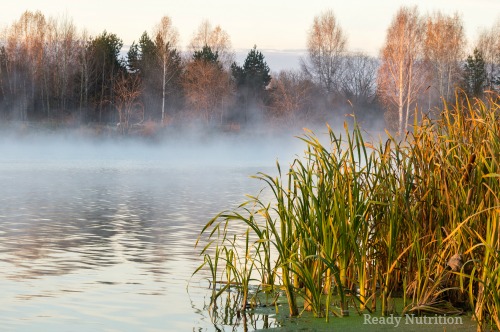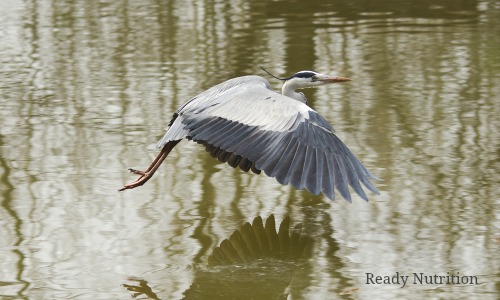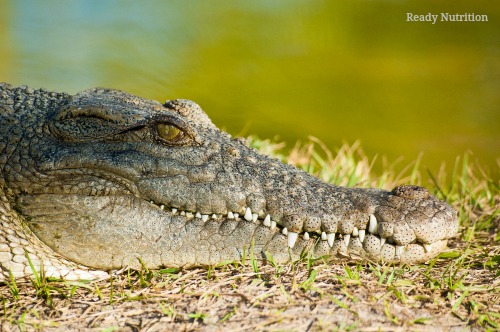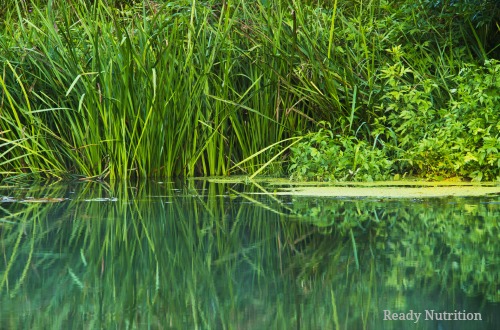My wife and I had planned a canoe trip in the late fall of 2003. The location was Chicot State Park, approximately 160 miles (250 km) northwest of New Orleans. We had rented a secluded cabin without a telephone or television to enjoy a quiet, peaceful weekend. The temperature was about 40ºF with gusts of cold wind, but the sun was shining and the sky was clear. We could not have asked for a more beautiful morning. After breakfast and coffee, my wife and I prepared for a day trip. We had planned on visiting the Ranger station to rent a canoe. We would then explore the park’s lake, which features more than twenty miles of shoreline.
As a former Green Beret of the U.S. Army Special Forces, I always prepared meticulously for any outdoor excursion and this outing was no exception. As my wife packed some food, drinks, and her camera supplies, I continued to organize my equipment. She smiled as she watched me stuffing items into the waist pack attached to my LCE. The LCE (Load Carrying Equipment) is a web belt and shoulder strap suspenders of olive green; it is U.S. Army issue.
I packed a day’s worth of canned food, rope, a flashlight, and matches into the waist pack. I had waterproofed the matches by folding the pack and placing it into an empty, plastic, 35 mm-film container. Also included were fire starters I had made by pressing lint and sawdust into paraffin, along with my metal match, water purification tablets, super-glue (never leave home without it), a small first-aid kit with antibiotics, and my MSW (minor surgical wound) kit, Army issue. Last to pack were my 9 mm and two clips along with my 10” Gerber BMF knife. My wife smiled at me and I grinned back at her
“You never know what can happen,” I said to her, and she nodded.
My wife did not question my preparations; she knows me. She also understood that many years of soldiering influenced my actions. She sat and enjoyed her coffee, waiting patiently as I finished.
We rented the canoe and began our trip approximately 0945 hrs. Along with the pair of paddles I took two life vests. I have always been a strong swimmer, flourishing in grueling conditions ranging from the ocean to rivers with strong currents. I had the extra vest, but didn’t use it myself. My wife on the other hand, cannot swim, and I helped her into the orange vest, adjusting the strap snugly about her torso. I rechecked it before we entered the canoe.
We struck off, following the shoreline for a linear distance of roughly 2-3 miles. We spotted a red-tailed hawk and followed him as he traveled from tree to tree with our approach. He soon tired of our company and departed, winging his way across the lake as the red plumage of his tail feathers waved us a silent goodbye.
We noticed the diversity of creatures all around us: ducks, cormorants, and several gray herons. The fall is a quiet time. All of the living things rest: plants and animals patiently await the cold months and the slumber before the spring. .
My wife and I were feeling reverence for the special quietude; therefore, we spoke very little during the trip. After a few hours of sightseeing, we reached the shore beneath the slope of the hill where our own cabin was perched. We decided to break for midday meal. The day had been wonderful thus far, and after we ate, we returned to the canoe and resumed our trek.
Proceeding northward, we entered a cove, remaining silent as we searched for wildlife to photograph. The coves of the lake are inlets shaped as the letter “C,” generally measuring 100-200 feet in their diameters. The coves are rife with tall cypress trees with wide bases measuring on average 6-10 feet in diameter. The bases of these trunks are wider still, and they have knobby growths protruding from the waters. The still, almost stagnant waters of the cove, the fallen logs upon the banks, and the seclusion provide optimal sunning points for alligators.
We wanted a photo of one of the saurians. The larger ones, we had been told by the Ranger station, were still quite active even this time of the year. Guiding the canoe from my position in the bow, I maneuvered and paddled among the cypress trees. The waters were dark and still, and a crisp, cold wind was blowing.
I turned around in my seat, making the bow the stern, now. I was trying to change my position and paddle the canoe in reverse to give her the lead vantage point. As she adjusted her position in a semi-squat, I shifted in my seat, causing the canoe to rock. My wife was slightly off balance and she took a step. Still seated, I sort of fell to my left side, causing the canoe to lean to my left and the edge to dip below the surface of the water. Then disaster struck: the momentum of my lurch carried me over the edge and I fell over the side of the canoe. The ice-cold waters of the dark swamp pulled me down and I went underwater for about half a second. The cold hit my body as suddenly as a slap on the face.
My wife screamed. It was almost as if I watched the scene in front of me moving in slow motion; I was powerless to stop it. The canoe tilted upward, as I was no longer inside it to balance it, and she fell off of it and into the lagoon. The canoe scuttled, filling with water and turning upside down. My wife screamed as she struggled before me in the frigid waters and my heart felt as if it would die. The cold waters chilled me and made me feel sluggish as I struggled to tread water, laden down by my clothing. Death was close to us.
The ice-cold waters tugged at my jungle boots and pants legs, threatening to pull me under, but I struck forward, swimming toward my wife. My heart was pounding. I had caused the accident and my wife could not swim. In the midst of my torment, my eyes took in a wonderful sight: a blur of orange beneath my wife’s flailing arms.
The life vest!
I struggled to reach her side. Fueled by fear and panic, she had started to kick and paddle frantically, and she was whimpering softly.
“Honey, I’m here! I’m coming, honey!” I yelled as I approached her and came alongside of her. A quick glance told me that the canoe was still capsized. The life vest was doing its job. She was heavily clothed and the only thing that kept her afloat was the vest. I breast stroked beside her and pulled her by the shoulder toward the bank.
“Go that way, baby! Go that way!” I said as I pointed and pulled her toward the bank, and she nodded. The vest had her weight, and she began to paddle and kick as I swam beside her. If she went under, I would swim for both of us. I would be her lifeline.
My own life meant nothing to me at that moment. Only saving my wife mattered. Only that. Roughly 100 feet lay between the shoreline and us. I wouldn’t let her die because of my own mistake with the canoe. I would not fail.
“Stay beside me! Stay with me! That’s it, keep paddling, it’s helping! Keep going!” I gasped.
It only helped a little, but I exhorted her and coached her, trying my best to sound both confident and assertive. It kept her mind active and focused on a task. The water was barely above freezing, and we wouldn’t last much longer. I began to feel sluggish as the cold went into my torso. Following the cold the numbness began to creep into my chest and legs. Suddenly a new thought came into my mind, a very disturbing thought that felt as if I had been shocked electrically.
The alligators.
I pushed the thought out of my mind. I prayed that if one came, it would attack me and not her. We paddled forward ever so slowly. I noticed that my wife was becoming tired and sluggish and her sobbing was abating. I grabbed her jacket by the left shoulder, urging her on and pulling her as I switched to sidestroke.
“Hold on, honey. We can make it. I’m with you,” I told her, and she nodded, her teeth chattering. We had about another 25 feet to go. My eyes scanned from side to side, searching for the familiar, telltale splash that would indicate an alligator’s entry into the water from the banks. I saw nothing and mentioned none of these thoughts to my wife. She was already petrified and needed no distractions.
“Keep going, honey,” I urged, feeling my own fatigue.
We made it ashore, soaking wet from head to toe in the winter wind. We shivered violently from the cold and the fatigue, but we were alive. As we arose to our feet shakily, I turned back and faced the cove. My chest was heaving and my eyesight was blurred. The canoe was in the middle of the cove. The paddles had each floated off in opposite directions, and the canoe was upside down. I was exhausted. But now we faced a new set of problems: we were wet, exposed to the cold and wind, and in mortal danger from hypothermia. We desperately needed a fire.
I spotted my LCE floating in the water. The waist pack had trapped air that buoyed the LCE. It was about 50 feet away, roughly half the distance between the shore and the capsized canoe. My wife looked at me.
“No! You can’t go back in there!” she pleaded as I stared at her, shivering.
“You’re too tired! And what about the alligators?” she added, and my heart sank: I realized she had been afraid of them while we were in the water even though I never mentioned them to her.
“We need the supplies in my waist pack. We have to have them. We’re miles away from the cabin. Nobody knows we’re here. We need the gear. Without a fire, we won’t last the night if we get stuck out here.”
My wife blinked: she understood, now.
“I put us into this. I have to go back in there. If not, we die.”
Tears came into her eyes.
“It’s the only way,” I said, and stripped the life vest off of her. I put it on myself and adjusted the straps. After securing the belt link, I walked toward the water, and all of a sudden I felt a sharp pain on my left hand.
Somehow I had sliced my thumb open: a deep gash. I had not felt it at first because of my numbness. The blood began to flow, now. I hid the view of it from my wife and tried to appear well, and then I went to the water’s edge as my wife stood on the bank, shivering and praying. I entered the bone-chilling waters with trepidation. I wasn’t so much afraid of the alligators, but I was afraid that if one came I wouldn’t have the strength to fight it off. The thought of one rolling in the water with me in its jaws came into my mind in a vivid picture. I pushed the thought out of my head as I swam toward the equipment.
“Please help me to reach it,” I said continuously as I swam toward the LCE.
My wife was depending on me. I churned my limbs methodically. They felt as if they weighed a ton. I moved through the water with painful slowness, thinking of the bleeding thumb and the alligators. After what seemed an eternity, I reached the LCE.
I turned around, paddling back to the shore as I pushed the floating LCE ahead of me in the water. The numbness was returning into my limbs again. I began to tire, feeling the water weigh me down even with the vest. Twenty feet. Fifteen. Ten. I almost went under, but made it to the bank. I crawled up on it and wanted to collapse. I was nearly dead.
But I couldn’t collapse or die. Not yet. My wife was depending on me. She needed me to build a fire for us. The process was further complicated by the cold. With painful effort, I began to break dead branches and sticks for fuel and gathered dry leaves together, then packed in two of the fire starters as she watched me, shivering and almost paralyzed by the cold. I was too numbed to direct her to help me; my wife did not know how to do these things at the time. My heart raced as I removed the film container from the LCE. Popping the plastic lid off, I tensed as my fingers pulled the folded match pack forth.
“They’re dry,” I managed to gasp.
In a matter of five minutes, I had started a small fire. Stripping off my Army fatigue top and leaving only a T-shirt, I spread my top upon a branch before the fire. I removed my wife’s jacket, spreading it out next to my top and then helped her to nestle before the fire. I quickly began to gather wood as she warmed up. The wood gathering brought my circulation back as the fire began to dry out our clothes. I knew from my military training that the fire would be much help to her: fires provide crutches for survivors of catastrophe by giving warmth and feelings of safety. We still were not out of danger yet.
“We’ll make it out of here. I will get us out,” I promised her, and she nodded.
I looked at my wife, meeting her eyes with my own.
“I tipped us. I’m sorry. I’ll get us out of this, though.”
“I know you will. I trust in you,” she added.
At that moment those words meant more to me than anything in the world.
I had sliced a deep gash in my thumb, and I bandaged it up with a strip of gauze from the first aid kit, and applied the crazy glue to the edges of the cut, holding them until they sealed. It would later need stitches (seven of them: I did them myself). I knew by the amount of blood that another trip to try for the canoe would be nothing short of suicide. My circulation had returned. When I went in before, my bleeding had been much slower due to my core temperature’s coldness. I had Keflex (Cephalexin), a 2nd generation Cephalosporin in the first-aid kit, great for soft tissue injuries. I threw down 4 capsules for 1000 mg loading dose and gulped some water from my canteen.
“We’ll walk out of here,” I informed my wife.
My watch was a sturdy G-shock Casio. It had survived the swamp, and it now informed us that it was 1430 hrs.
“Should we follow the shoreline?” she asked.
“No. The underbrush is too thick. It would slow us down. Plus, there could be an alligator sunning itself.”
She nodded, looking at the cove. She did not want to stay here much longer. I mounted the life vest upon a tree that was close to the water’s edge. This would help to find the canoe later on. Our tops were dried. After we donned them, I repacked my LCE and threw it on. I used my canteen cup to tote water to the fire and put it out. We had a 19-oz can of beef stew from the can off of the coals of the fire and a candy bar. After I had stirred the coals into a watery muck and was sure the fire was dead, I packed up the trash and we struck off.
I led the way, and we busted brush for about 500 feet. I had armed my wife with a stout branch that I fashioned into a club. The 9-mm and the ammo were safe. A little tip: on trips I always tie the pistol off in a plastic bag for vegetables from the grocery store, and shove it into my holster. The bags are thin enough to still pull the trigger and use it without removing it, they don’t impede the draw, and they keep out the water.
We climbed up the steep slope toward the ridge. In addition to alligators (that do come on to the land), the Ranger station that morning had informed us that a large wild boar with huge tusks was roaming around in the woods. The boar was more than 200 lbs. If that was not enough, there were also a few black bears in the area as well. After fifteen more minutes of climbing, we reached the summit of the hill, breathing heavily.
“Look!” my wife said excitedly, pointing down below: she had spotted a trail. The trail meandered for quite a distance and we had a substantial walk ahead of us. I had taken note of the area of the cove before we departed and shot an azimuth from the center of the cove with my Lensatic compass. This kept us steady in the general direction of the cabin. We soon noted a sign that read “Backpack Campsite 2” next to the cove upon the hill’s summit. Our footgear was still wet, but the rest of our clothes had dried for the most part. I led the way, setting a brisk but steady pace. Every quarter of a mile we stopped to rest and take water from the two 1-quart canteens upon my LCE. Coming to a point where the trail continued in orange and bifurcated into another path marked Emergency Trail, my wife and I halted.
As we continued, I checked every patch of grass, eyed every fallen log, and cautiously probed the blind spots with suspicion for bears or the boar. We had covered about three miles and the sun was going down. Eventually we reached a place where the woods thinned out and I squinted.
“The hardball,” I said, referring to the paved macadam of a road, and we looked at one another and smiled. We had made it through the near-death struggle: the capsizing, the physical battles with the water and the cold, and the dangers of weather and beasts. The Ranger station confirmed the dangers we had suspected: they informed us that a 14-foot long alligator lived in the exact same cove where we had capsized.
The alligator had been seen on the very bank we reached just a day before.
Hope you enjoyed this one, Ready Nutrition Readers! Have a Great Day!
Jeremiah Johnson





What a shame you were not better trained,you did well,no question,I will take nothing away from you.For everyone else out there :- 1 .:- Always tell 2 responsible people EXACTLY where you are going and what time you expect to return then if things go wrong they will start the search,if you don’t tell anyone ….guess what.2 Always WEAr your belt-order emergency kit.3 when on water TIE the oars to the boat and make sure there is a float secured to the boat .You and your wife would not have made it in rapid water or if you had been injured.Train your wife and stay with the canoe next time.I trained mountain leaders.
Good story.
Hindsight is 20,/20 and you and yours made several serious mistakes though I wont nit pick you with them. YOU can do that yourself.
But please know that in colder temps like these, Alligators are not a threat. Their metabolism shuts down. Its why and how duck hunters can hunt these areas with their dogs, and not worry about losing their dogs when they encounter alligators.
Far as boar go, they are scent and hearing animals, Strictly. Eyesight is very poor.
Bears not a threat with no young almost as a rule, far as blackies go.
Carry on.
Excellent! Thank you for the share.
thanks for the read.
I enjoyed your story and preparedness.